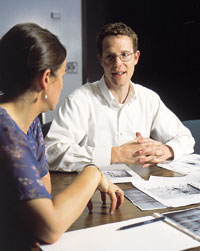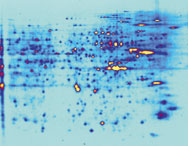

A publication of The Graduate School, University of North Carolina at Chapel Hill
Archives Fall 2001
Home | Back issues | About us | Email your feedback | The Graduate School | UNC-Chapel Hill | Make a gift

Jon Gelfond studies a new way to help patients
Jon Gelfond could be working in a hospital today, treating patients and completing his training to practice medicine. After all, he has the medical degree to do it.
Instead, he is at UNC-Chapel Hill, topping off his already advanced education by pursuing a Ph.D. in biostatistics. He still helps to treat patients, albeit in a different sort of way.
It wasn’t easy to resist the expectations of peers at the University of Texas at San Antonio that he — like they — would want to practice clinical medicine. But Gelfond always knew he preferred research, and being offered a Kenan Fellowship for doctoral research at Carolina gave him a little push in that direction.
 |
| Photo by Will Owens |
| "Proteomics is a potential way to detect disease and prevent side effects from drugs — it's very powerful." |
The fellowship “was a key factor. It lifted a big burden off my shoulders,” Gelfond said. “That opened my eyes and let me explore what was out there,” he said.
What Gelfond found was a renowned
biostatistics center at UNC-Chapel Hill, where professors “make abstract
principles tangible” and where the academic program is nestled comfortably
within the rest of the campus.
“Sometimes, schools of public health are isolated from the rest of campus,” he said. “Here, you can walk right from the biology department to the philosophy department and gain a new perspective on the problems you’re dealing with.”
With an undergraduate background in mathematics, physics and philosophy, Gelfond said he believes using an interdisciplinary approach in his research helps him see how his research fits into life’s “big picture.”
In biostatistics Gelfond uses both his undergraduate and medical degrees. And as one of only a few physicians in the program, Gelfond offers a unique and valuable clinical perspective to his peers.
Gelfond specializes in proteomics — the study of how an organism’s proteins change as it responds to its environment. To determine the potential effect of a cancer-causing agent on a mouse’s liver, for example, Gelfond would analyze and compare images of the protein patterns of exposed and unexposed mice. Subtle differences in protein patterns could elucidate the molecular derangements that cause cancer to develop.
Researchers have recently used proteomics in clinical trials to examine a possible cause of side effects from drugs taken by transplant patients. Gelfond said this research helps scientists find ways to block side effects in susceptible patients.
Gelfond added, “Proteomics is a potential way to detect disease and prevent side effects from drugs — it’s very powerful.”
 |
| Computer-enhanced image of a proteome on a 2-D gel. |
As a biostatistician, Gelfond said he thinks he may be able to help patients in ways that he couldn’t with clinical medicine. His research may even prevent some people from needing to visit the doctor’s office at all.
Once he completes the four-and-a-half-year program, which Gelfond started in 2000, he hopes to teach in a university setting or do research for a corporation. Many pharmaceutical companies hire biostatistics graduates to design and run their drug trials.
“It’s both academic and professional, but it’s all research, and that’s why I like it,” Gelfond said.
In addition to his Kenan Fellowship, Gelfond also received the Fryer Fellowship within the biostatistics department and a prestigious, five-year Howard Hughes Fellowship to help fund his research and expenses.
In his spare time, Gelfond enjoys hiking, art and cooking — the latter because of the science behind it. Sometimes, he says, his “experiments” are not edible, but he has fun doing the research.
-Cindy Elmore
© 2002, The Graduate School, The University of
North Carolina at Chapel Hill
All text and images are property of The Graduate School
at the University of North Carolina-Chapel Hill. Contact Sandra Hoeflich
at shoeflic@email.unc.edu
to request permission for reproduction.
Contact Alexandra Obregon at aobregon@email.unc.edu if you have technical problems with this Web site.